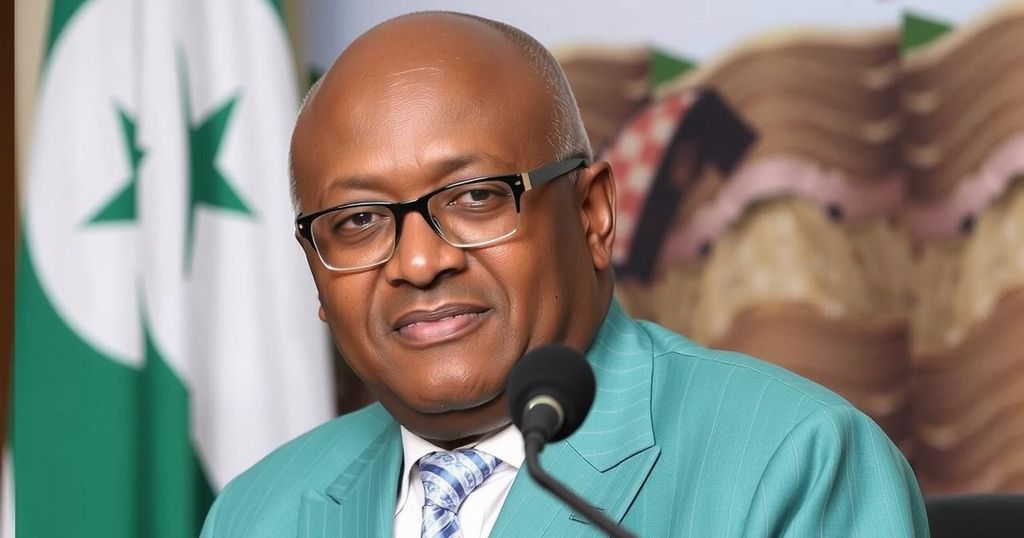President Bola Tinubu aims to revitalize Nigeria’s mining sector as part of diversifying the economy. The government has introduced measures to address illegal mining activities that hinder economic growth. A Value Addition Policy and new mining rates have been implemented to enhance revenue, while security measures protect mining operations. Although recent statistics show slight growth in the sector’s GDP contribution, stakeholders call for further reforms and consistent policies to maximize its potential.
President Bola Tinubu, who took office on May 29, 2023, has made it his mission to transform Nigeria’s economy from a monolithic structure to a more diversified one, with a focal point on the solid minerals sector. Given Nigeria’s wealth in various minerals, it is surprising that these resources contribute minimally to the nation’s Gross Domestic Product (GDP). In response to this dilemma, Minister of Solid Minerals Development, Dele Alake, announced a state of emergency in the sector, attributing the hindrances to illegal mining activities that are allegedly linked to banditry and insecurity in the northern regions of the country.
To combat these pressing challenges, the administration has embraced both coercive and persuasive strategies. A new security unit, the Mining Marshals, has been formed to safeguard mining operations, with over 2,570 personnel enlisted for duties across Nigeria. Simultaneously, the government is working to integrate legal frameworks that formalize the operations of artisanal miners, which has led to the establishment of 250 cooperatives.
Furthermore, the government is addressing the issue of under-valuation of its mineral resources in the international market by instituting a Value Addition Policy. This requires mining companies to submit comprehensive plans for enhancing the value of minerals as a precondition for obtaining mining licenses. Stakeholders are optimistic about recent developments, including the launch of advanced laboratories for geochemical analysis of minerals, which are vital for accurately identifying and quantifying mineral deposits.
In terms of revenue generation, the government implemented a new framework for increased mining rates and charges in July 2024 designed to enhance infrastructure and service delivery. This initiative is projected to maximize revenue from critical minerals such as lithium and gold. The recent revocation of 924 dormant mining licenses underscores the commitment to excluding non-serious players from the industry and attracting substantial investors.
Although the Nigeria Extractive Industries Transparency Initiative (NEITI) reported a slight increase in the sector’s GDP contribution for 2023, experts believe that with increased focus on addressing state interference, over-regulation, and tax-related issues, further growth is possible. The lifting of the ban on mining exploration in Zamfara is expected to remedy revenue losses and curb the activities of illegal miners, as stakeholders advocate for policies that promote local content in the mining sector.
Lastly, important mining conferences highlight the ongoing need for innovation, advanced technology, and public-private partnerships to foster sector growth. Stakeholders express cautious optimism about the current administration’s initiatives but emphasize that consistent, effective reforms are needed for long-term success.
The Nigerian mining sector, endowed with numerous minerals crucial for global energy transition, has long been underutilized, impacting the nation’s economy significantly. Despite holding 44 minerals in commercial quantities, the sector’s contribution to Nigeria’s GDP has remained low. The administration under President Bola Tinubu seeks to reverse this trend through strategic initiatives led by Dele Alake, the Minister of Solid Minerals Development, aiming to protect domestic resources and enhance revenue generation. The relationship between illegal mining and local security issues complicates this endeavor, prompting a multi-faceted government response.
In summary, President Bola Tinubu’s administration is actively working to rehabilitate Nigeria’s mining sector through both structural reforms and security measures. The establishment of the Mining Marshals and the introduction of the Value Addition Policy represent significant steps toward formalizing the industry, while the new rates for mining activities aim to bolster economic contributions. There remains, however, a pressing need to address issues of regulation and local content to fully unlock the sector’s potential, signaling a cautious but hopeful outlook for the future of Nigeria’s mining industry.
Original Source: nannews.ng






